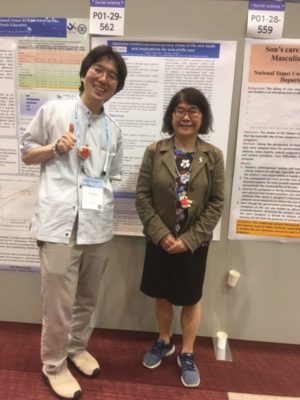
12 June 2023
Zaiya Takahashi and Masako Osako gave a presentation, “Japanese traditional/contemporary views of life and death ('Shiseikan') and their implications for the end-of-life care”, at IAGG Asia Conference in Yokohama, Japan.
The paper is based on a review of available research literature in Japan. Its main conclusions include:
1. Risking gross simplification, it may be stated that there have been two main views of life after death in Japan:
a) The oldest animistic belief in Japan is that a dead person returns to the “universe,” stays there for a while, and then gradually melts and disappears, while
- b) Buddhism later provided an image of “a place where one’s ancestors live” as a place to which a dead person may go after death.
These views/beliefs have fostered a culture that portrays dying as “departing to a community with ancestors” and de-emphasizes “the discontinuity between death and everyday life” (Kato, 1977; Tatsukawa, 2018).
2. A large number of surveys have recently been conducted on this theme, as reported by Miyashita et al. (2007) and Nakagi et al. (2013). They report that contemporary Japanese views of life after death are very diverse, but many respondents express a belief that “life after death exists” and hope to “be united with deceased family members” after death. Another Japanese characteristic is the emphasis on the dying person’s “reconciliation with life” at the time of death, which is reported to be important for a peaceful end-of-life experience.
3. Traditional views of life and death (“shiseikan”) in Japan are closely related to the characteristics of Japanese religion. Bellah (1985, first published 1957), in his work on Japanese religious beliefs and society during the Edo period (17th-19th centuries), states that the fundamental characteristic of Japanese religion is “harmony.” Although there have been different schools of religion in Japan, such as Shintoism, Buddhism, Confucianism, and mountain worship, they share a common perspective of “gratitude toward nurturing being” and “identification with the ground of being,” which helps to harmonize the different elements. Recent surveys by Miyashita et al. and Nakagi et al. show that even after lifestyles and social structures have greatly changed since the Edo period, Japanese people still value reconciliation (harmony) as a good (desirable) death.
Zaiya Takahashi is the Director of the Department of Research and Social Implementation at Japan Home Health Care Alliance. Masako Osako is the Executive Director of the Secretariat at the International Longevity Global Alliance, Ltd.
Dynamic knowledge synthesis in local networks for coherent elderly care
We are getting older and more diverse, and that brings challenges. We cannot solve these challenges through healthcare alone. We also need municipalities, schools, companies, housing associations and older people themselves to achieve an age-friendly society. This requires cross-domain collaboration. But how can we achieve that?
25 April 2024
Event summary – Healthy ageing and longevity in Europe: How do we prepare for the 100-year life?
In partnership with ILC-UK, the ILC Europe Network hosted its inaugural conference in Brussels on 6 March 2024 to explore the challenges and opportunities associated with an ageing European society. Other ILC Global Alliance members in attendance included ILC-Czech Republic, ILC-France and ILC-Netherlands.
March 2024
White paper Arts in Health in the Netherlands: Art deserves a prominent place in healthcare
Much more attention needs to be paid to the positive effects of the use of art in healthcare. Art makes people feel better and helps them to better cope with their illness. Art can also mean a lot in the social domain and prevention, and in shortening hospital admissions.
February 2024


